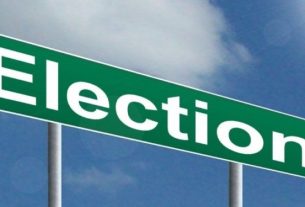President Muhammadu Buhari on Thursday granted posthumous presidental amnesty to a foremost nationalist, Chief Anthony Enahoro and Prof Ambrose Alli, a former governor of the defunct Bendel State.
It is clear for what reasons Alli was granted pardon: a military tribunal during Buhari’s first coming as head of state convicted Alli in 1983 for misappropriating ₦983,000 funds for a road project. The pardon, therefore, means he ceases to be considered an ex-convict, officially, although the military tribunal was condemned by local and international rights groups for being draconian and non-transparent.
However, the case of Enahoro is different. He was jailed alongside other leaders of the defunct Action Group (AG) – then Nigeria’s main opposition party led by Chief Obafemi Awolowo. Enahoro, Awolowo, Alhaji Lateef Jakande, who would later become governor of Lagos State, and other AG leaders were tried by the Tafawa Balewa civilian government for plotting to overthrow the government. They were jailed for treasonable felony.
However, as contained in a Gazette (No. 81 of vol. 53) dated August 12, 1966, and signed by Lt. Colonel Yakubu Gowon, the then military head of state, Enahoro was granted full pardon for the offence of treason for which he was jailed in 1963.
Although during the British colonial era, Enahoro was jailed at least on three occasions, all on the count of sedition. These were for his critical exposés on the British government as a journalist.
Whether or not this was the reason for which Enahoro got the posthumous pardon is unclear.
Interior Minister, Alhaji Rauf Aregbesola who announced the presidential amnesty on Thursday offered no details aside listing the beneficiaries of the pardon.
The ministers of interior and information, as well as the attorney-general of the federation, could not provide further clarification on Enahoro’s pardon.
A spokesperson of the interior ministry referred all enquires on the matter to the justice ministry.
When contacted, Umar Gwandu, spokesperson of the justice minister, said, “You’re sure that he was pardoned in the past? If there is any response I’ll provide for you.”
He is yet to get back or respond to further enquiries.
Information Minister Lai Mohammed and his spokesperson, Segun Adeyemi, declined to comment. So did presidential spokesperson Garba Shehu. Calls and messages to their phones were unanswered.
Enahoro’s family speaks
President Muhammadu Buhari was appreciated in a statement shared on Facebook on behalf of the Enahoro family, by the son to the late Enahoro, Eugene Enahoro.
Eugene Enahoro acknowledged the initial pardon by the Gowon regime. He added that the latest pardon would exonerate the late Enahoro for the persecution he got under the military junta.
Also, in what he described as an “erroneous trending post,” the younger Enahoro said his father’s pardon was not “related to his famous Treasonable Felony trial. IT IS NOT. Buhari’s pardons relate to what happened under military government.”
Odia Ofeimum, who worked as an administrative officer in the Federal Public Service Commission, and as a private secretary to late Awolowo, also said Enahoro was not convicted in any other trial apart from that of treasonable felony alongside Awolowo.
“No, not at all,” he said.
“I can remember that there was a probe on FESTAC under Obasanjo (as military head of state). At the time, Chief Enahoro was probed for $15,000 FESTAC funds. But he was not convicted.”
The Initial Pardon
In 1966, there was a turn of fate for Enahoro and other Action Group members. After Nigeria’s second military coup which brought in Yakubu Gowon, the new military ruler granted them amnesty.
The gazetted directive read thus: “Whereas Chief Anthony Eronsele Enahoro, having been duly convicted of the offences of treasonable felony, conspiracy to commit a felony and conspiracy to effect an unlawful purpose, and sentenced to imprisonment for seven, three and one years respectively on all three counts:
“And whereas the said Chief Anthony Eronsele Enahoro, having served a portion of the sentence originally imposed on him in September 1963:
“And whereas the Supreme Military Council after reviewing his case, is pleased to remit the sentence and to grant a full pardon:
“Now therefore, in exercise of the powers conferred by section 101 (1) of the Constitution of the Republic and of all other powers enabling it in that behalf, the Supreme Military Council do hereby remit the unexpired portion of the sentence imposed on the aforesaid Chief Anthony Eronsele Enahoro and grant him a full pardon.
“Given under my hand and the Public Seal of the Republic of Nigeria at Lagos this 2nd day of August, one thousand nine hundred and sixty-six.”
Gowon would later appoint Mr Enahoro as Federal Commissioner (Minister) for Information and Labour in 1967.
Premium Times





